[Newspaper]
Publication: The Muncie Morning News
Muncie, IN, United States
vol. 22, no. 62, p. 2,3, col. 1-7,1-7
FLINTS, THE CITY'S YOURS!
MUNCIE IS PROUD TO
GIVE THE GLAD HAND
TO A. F. G. W. U. OF N. A.
City in It's Best Reception Gown, Trimmed With
the Red, White and Blue.
LIST OF DELEGATES WHO HAVE ARRIVED
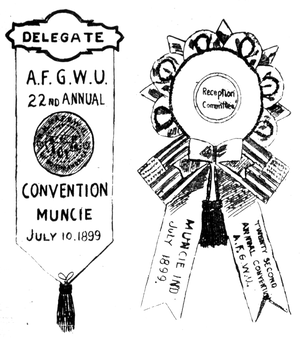 |
And Full Roster of All Representatives of Local
Unions Delegated to Convention.
HISTORICAL SKETCH OF THIS GREAT UNION OF LABOR
Founded by "Gaffer" Smith of Brooklyn, N. Y., Over a
Score of Years Ago, It Has Grown and Prospered
Exceedingly — Program of the Convention — Tomorrow's
Big Parade — A Suggestion on Punishment of
Defaulters — Portraits of Reception Commmittee.
Convention week, the time looked forward to with great eagerness by thousands of flint glass workers the country over, and many citizens of Muncie, for the past few months, has arrived, and Muncie, the place of entertaining the meeting, is in readiness for the throng of visitors with open arms.
The work of decorating and making other preparations for the event has occupied considerable time, much work and expense, but it has been well done, making congratulations to the Committee on General Arrangements appropriate at this time.
The delegates have been coming for the past two days, but yesterday the number of arrivals was greatly increased, and today there will be a multitude on each incoming train. The Eastern delegates, from the vicinity of Pittsburg, will arrive this morning at 9 o'clock from the South. The Indiana band will be at the depot to greet this delegation, and committees will meet all other trains.
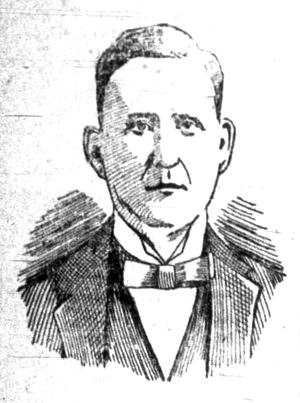 |
| C. SHEEHAN. |
Tomorrow big crowds of visitors will come to witness the parade and hear the eloquent addresses that will be made in the afternoon at Heekin Park.
A telegram from Elwood asks Muncie to assist in getting a special train for their people to return home on Monday night. The telegram states that 700 tickets will be sold. It is hoped that some arrangements will enable Elwood and the other towns to get here. There is a special rate, but no service for the people to get home in the evening.
Today President Gompers, "Golden Rule" Jones and other renowned speakers will arrive to take part in Monday's program, and all now in readiness for one of the greatest meetings in the history of the organization.
DELEGATES WHO ARE HERE.
The arrivals of delegates up to the present time are as follows:
Thomas Conboy and J. Fitzsimmons, of Alexandria.
James Wheeler, Jr., of Pittsburg.
E. J. Dillon, of Marion.
Harry Barrett and Jacob Huonker, of Martins Ferry.
Charles Schramm, Joseph Campbell and Patrick J. Finn, of Montreal, Can.
Anthony Kelley, of East St Louis.
George Epperman, of Bellaire.
William Vallely, of Toledo.
Charles E. Jewell and William L. Reback, of Newark.
Thomas Powers, of Bellaire.
Carl Stiglitz, George Kelley and Daniel Kretz, of Elwood.
P. J. Scalley, of Wheeling.
Jacob Taylor, of Marion.
T. W. Taylor and J. S. Cowley, of Toledo.
Harry Ebert, of Zanesville.
Dominick McGrail and Charles Williams, of Bellaire.
Fred Whitefield, Thomas Cavanaugh and P. J. O'Hanlon, of Elwood.
John A. Voll, member of the Executive Board (prescription branch), of Zanesville.
THE DELEGATES
List of Men Who Will Have Voice in the Meeting.
The following is a list of the delegates who will be in attendance at the convention:
No. 1 — Brooklyn, N. Y.: Henry T. Smith. John Kelleher, Matt Farrell.
No. 2 — Muncie, Ind.: C. N. Edmonds, John Clark, William Floto, Michael Short.
No. 3 — Alexandria, Ind,: Thomas Conboy, J. Fitzsimmons.
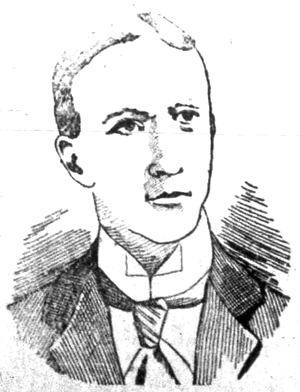 |
| JOHN FITZGIBBONS. |
No. 4 — Pittsburg: Joseph Schmitt, Nick Maner, Wm. H. Werner, Louis Kantzlister, Jacob Hoffman, Henry Schohe.
No. 5 — Pittsburg: Frank Cready, Jos. Koehnlein, Jacob Closz, Jas. Wheeler. Jr.
No. 6 — Marion. Ind.: Thomas Kenney, Pat Murray, Hal Conroy. Theo. Ring, W Prltchert, Louis Winstel, E. J. Dillon.
No. 7 — Millville. N. J.: E. C. Beebe.
No. 8 — Steubenville, O.: Edward Enders, Fred Haupt, Owen Connors, Hugh McGinniss, Jas. Garvin, John McCullough, William Roach.
No. 9 — Wheeling. W. Va.: John Corcoran, F. D. Strasser.
No. 10 — Moundsville, W. Va.: John Mullen, George Roberts, William Leonard.
No. 12 — Pittsburg: George Marlier.
No. 15 — Martin's Ferry, O.: Harry Barrett. Jacob Huonker.
No. 18—Millville. N. J.: E. F. Fagan, Mark Branin, George Parsons, Eugene Hand.
No. 21—Pittsburg: D. W. Vaux.
No. 22—Philadelphia: James McGinness.
No. 23 — Muncie, Ind.: T. J. McElherron, Albert Meacham.
No. 24 — Montreal. Can.: Chas. Schram, Joseph Campbell, P. J, Finn.
No. 26. — East St. Louis, Ill.: Anthony Kelly.
No. 26 — Bellaire, O.: Geo. Upperman.
No. 28 — Toledo, O.: Wm. Vallely.
No. 30 — Newark, O.: Chas. E. Jewell, Wm. L. Reback.
No. 33 — Gas City, Ind.: Edward Day, D. Hand.
No. 34 — Bellaire, O.: R. W. Archer, Thomas Powers.
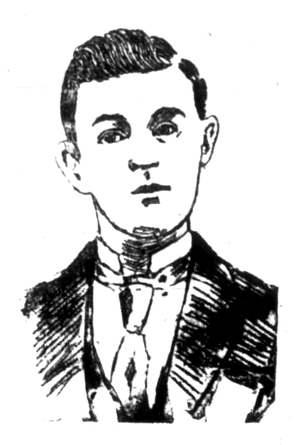 |
| CON CANNING. |
No. 35 — Marion, Ind., Auburn E. Long.
No. 36 — Monaca, Pa.: J. W. Moorehouse, T. W. McCreary, Ed Whitehead, J. A. Johnson.
No. 37 — Alton. Ill.: Thos. King, Chas. Wood, Geo. Demuth, Wm. Carson.
No. 38 — Beaver Falls, Pa.: John Balzer.
No. 40 — Marietta, O.: Harry E. Campbell.
No. 41 — Charleroi, Pa.: Wm. E. Mitchell, David C. Lindsay, John Herman, Jos. Bell.
No. 42 — Pittsburg: Thos. Smith, Albert Beebe, Wm. Hartley, Frank L. Smith.
No. 43 — Ellwood City, Pa.: Michael Dunn.
No. 44 — Alton, Ill.: Geo. Pancoast.
No. 45 — Marion, Ind.: Harry Roessler.
No. 46 — Millville, N. J.: Thos. Hollingsworth, Sr., Ralph Barber.
No. 47 — Millville, N. J.: L. W. Schlagel, Samuel Cossaboon.
No. 48 — Avenue, Pa.: Geo. Frederick, John Dougherty.
No. 49 — Tarentum, Pa.: John B. Beattie.
No. 50 — Elwood, Ind.: Carl Stiglitz, Geo. Kelly, Daniel Kretz.
No. 51 — Pittsburg: F. C. Dickens.
No. 53 — Wheeling. W. Va.: Harry Webb.
No. 54 — Ottawa, Ill.: A. J. Ward, Richard Miles.
No. 55 — Washington, Pa.: William McLaughlin, Jacob New.
No. 57 — Brooklyn, N. Y.: Thos. Byrne.
No. 58 — Wheeling, W. Va.: Wm. Wassmeyer.
No. 59 — Wheeling, W. Va.: P. J. Scally.
No. 61 — Greentown, Ind.: Chris Smetz.
No. 62 — Jeannette, Pa.: J. H. Williams.
No. 64 — Philadelphia: F. K. Peirson, Sr., Anton Springer, P. Hardin, Thos. Craig.
No. 65 — Homestead, Pa.: Chas. Bossert.
No. 68 — Philadelphia: S. Lowrey Homan.
No. 69 — Millville, N. J.: Howard Pinch.
No. 71 — Indiana, Pa.: George H. Ross, Chas. Brand.
No. 73 — Marion, Ind.: John A. McKeen, Joseph Lavick, Jacob Taylor.
No. 74 — Findlay, O.: Bert Marvin, Wm. Huck.
No. 76 — Elwood, Ind.: Samuel C. Stancliffe.
No. 77 — Butler, Pa.: P. J, Kelley.
No. 80 — Coraopolis, Pa.: Charles B. Voitle, Harvey Strong.
No. 81 — Toledo, O.: T. W. Taylor, J. S. Cowley.
No. 82 — Pendleton, Ind.: James Jones.
No. 85 — Newark. No. J.: Jas. A. Ray.
No. 86 — Jeannette, Pa.: Peter Schaaf, Phil Kearcher, Wm. Curran, Jacob Trainor, Max Froelich, Geo. Schaffer.
No. 87 — Sharpsburg, Pa.: Wm. Dell.
No. 88 — Anderson, Ind.: Jas. Morrison.
No. 90 — Baltimore, Md.: T. F. Brennan, Claude Greiner, Jas. Bland.
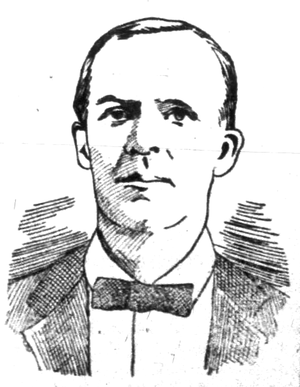 |
| T. J. McELHERRON. |
No. 91 — Muncie, Ind.: Samuel Hudson, Fred Gass. Con Canning, John F. Hinckley, Jr.
No. 95 — Zanesville, O.: Harry Ebert.
No. 99 — Bellaire. O.: Dominick McGrail, Chas. Williams.
No. 100 — Cumberland, Md.: James M. Conway.
No. 103 — Grapevine, Pa.: James S. Tracy, Chas. Lannenbacker.
No. 104 — Saltsburg, Pa.: John W. Langdale.
No. 111 — Jeannette, Pa.: L. Lautenschlager, August Weber.
No. 113 — Everett, Pa.: Wm. Doughty.
No. 114 — Elwood, Ind.: Fred Whitefield, Thos. Kavenaugh, P. J. O’Hanlon.
No. 116 — Summitville, Ind.: Jas. Wilcoxen.
No. 117 — Mt, Jewett, Pa.: F. J, Fitch.
No. 130 — Washington, Pa: John O'Brien.
No. 123 — Albany. Ind.: C. Braun.
No. 129 — Kane, Pa: W. E. Overs.
No. 131 — Charleroi, Pa.: Ernest Richer, D. H. Glunt.
No. 132 — Cicero, Ind.: Jas. Foley.
THE PARADE
Line Up of the Big Column That Moves
Tomorrow.
As previously announced the parade will form on West Main and West Washington streets, right resting on High street. The parade will move south on High to Jackson, east to Walnut, south to Willard, east to Grant and south to Heekin Park, where the speaking exercises will be held. The speakers' stand will be erected today in the northeastern part of the park.
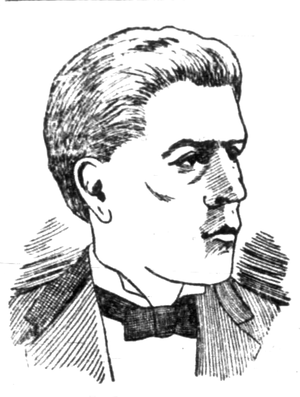 |
| WARD MULLEN. |
ORDER OF PARADE.
Chief of Police and Platoon of Patrolmen.
Police Commissioners and City Council in Carriages.
Speakers in Carriages.
Woman's International U. L. L. in Decorated Wagons.
Committee on Arrangements.
Indiana Band.
All Visiting Delegates to Convention.
Secret Societies and Orders.
Red Men's Band.
All Muncie Labor Organizations.
Visiting Labor Organizations.
Green Glass Workers.
Window Glass Workers.
Flint Glass Workers, from Unions Nos. 2, 23 and 91.
ALL IN READINESS.
All is in readiness at Muncie, Ind., for the flint delegates and the hundreds of their friends who will flock there next week. The greatest parade ever seen in the gas belt is promised for Monday, after which addresses will be made by Mayor Edward Tuhey, President Wm. J. Smith, Mayor S. M. Jones, of Toledo; President Samuel Gompers, Governor James A. Mount, Hon. John T. Tarvin, of Kentucky, and Senator Walter Ball, Judge J. G. Leffler and Hon. George Cromer, of Muncie. Tuesday they will have a big trolley ride. The delegates will attend matinee races on Thursday, and Saturday will be a great day of merrymaking with a picnic at Westside park. The banquet July 18 will be served by the Woman's International Label League, and will have a splendid toast line. — Pittsburg Commoner.
HISTORY OF ORGANIZATION
Interesting Facts of Early Days and
Officers and Union’s Growth.
The important labor organization which will be the guest of Muncie for the coming ten days in annual convention, has a membership of more than 7,800, composed principally of enterprising, bright young men, engaged in work that requires the greatest of skill, and for this reason they receive compensation on a par with the finest mechanics in the world, being able to make from four to seven dollars per day.
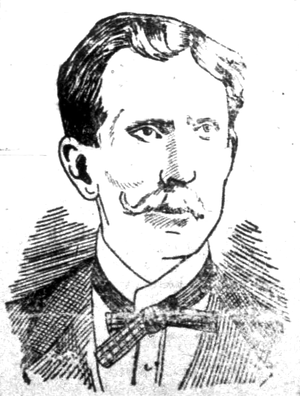 |
| FRANK E. DUKE. |
These wages have ruled since the introduction of the business in this country, but as a result of the strong organization that was effected in 1878, and has since been maintained. The great increase in the output of the ware and the natural increase in the number of workingmen would have long since crushed these wages, had not the organization of the American Flint Glass Workers' Union of North America been maintained, keeping in action a continued battle with the opposition in the form of non-union manufacturers.
These men first sought to make a business by underselling the manufacturer employing union laborers. This could only be accomplished by the employment of men who were willing to sell their labor cheaper than the union man. These non-union men were a class of inferior workmen who could not hold positions with the better class of mechanics. They had learned enough about the business to put out a class of work that would sell to those in quest of cheap wares, and have for years been the source of much trouble to both the union men and the manufacturers. It is plain to see why every purchaser should be in sympathy with the union man and encourage his employment to get the best articles to be made.
These conditions began to exist many years ago, and though, when the Knights of Labor organization was made late in the sixties, the flint glass workers did not join hands with it at once it became affiliated with the K. of L. in 1872, when about 300 men employed in front of the furnaces in the flint factories took membership. At that time it was not safe to let the fact be known that you were a member of the labor organization, for there was a strong prejudice against the members, not only glass workers, but those from all trades.
This little band of 300 continued with the K. of L. until six years after, when the number in the labor organization had grown to almost 1,500 and it was decided to secede from the mother organization and form a union independent from all other trades.
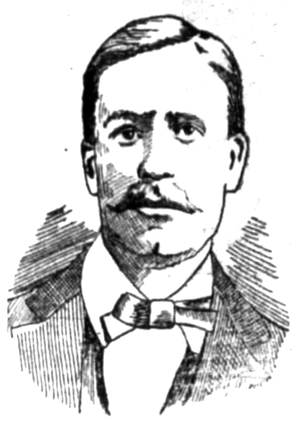 |
| SAMUEL HUDSON. |
The step in this direction was taken by James Smith, better known as "Gaffer" Smith, of Brooklyn, N. Y. He visited Pittsburg and other fields where there were flint glass workers and his efforts resulted in a call being made during the summer of 1878 for a meeting in Pittsburg. There was a big response to the call, and the American Flint Glass Workers' Union of North America, composed of members of the trade in the United States and Canada, was organized. The first executive officer, the president, was John Steele, a man from Steubenville, O., who proved as true as his name and he remained in office for two terms.
The next president elected to guide the ship was John N. Brannon, of Millville, N. J. with George W. Payne as national secretary and this good team remained in harness until 1883, when at the meeting held in Boston Thomas J. Ervin of Martins Ferry, O. was elected president and John A. Howard, of Wheeling, W. Va., was elected secretary.
At the next meeting in the year 1884, William J. Smith, of Pittsburg, the present incumbent, was elected president and Fred J. Munn, of Pittsburg, was chosen secretary.
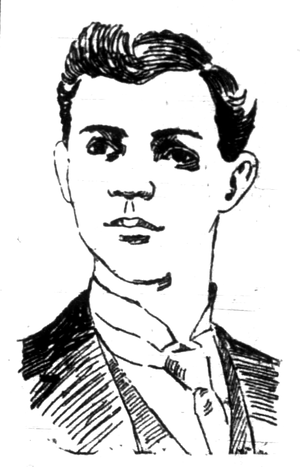 |
| WILLIAM FINLEY. |
At the next convention the office of secretary was made one with a salary, the work having grown to such proportions as a result of the increasing membership, that it required nearly the whole time of the officer to attend to it. This decided on, the salary was placed at $1,500 and when President Smith was re-elected to his old position, he was also elected secretary and did the work of both offices.
The next annual meeting occurred at Hamilton, Canada, and again President Smith was re-elected. It was wisely decided that there was need of a secretary to assist him in the work, and both offices were made salary stations. William Dillon was elected secretary. This pair of officers served until 1893 when at a meeting in Marion, Ind., John Kunzler was elected as the mate of President Smith and both officers have held their positions to the present time.
Brooklyn, N. Y., which furnished the real founder of the organization was given the honorary title of Local No. 1, and she has since held it. "Gaffer" Smith, the founder, was known as one of the most eloquent men in the labor world at the time, and a peculiarity about him was the fact that he cannot read or write.
The union is marked for many reasons, especially for the brotherly love among the members. There are no benefits derived from the National head, other than to pay allowances where labor troubles occur, the men engaged in the strike being given weekly allowances. There are other beneficial features to the organization inasmuch as each local has the privilege of paying a sick and death benefit, making assessments among the members for this feature. For a death the expenses incurred are paid, and a weekly allowance with nurse is the sick. When a funeral occurs, all that is necessary for a full attendance of the membership is the call of the president of the locals in the town.
The organization has several branches or trades, as follows:
Caster place.
Shade branch.
Prescription branch.
Chimney branch.
Iron mold branch.
Press branch.
Paste mold branch.
Mold makers.
Engravers.
Cutters.
Lamp workers.
These trades all affiliate with one another, the action of one trade being binding on the other for support.
CONVENTION SUGGESTION
Necessity of Enforcing the Punishment
of Defaulters.
A writer signing himself "Flint" makes an important suggestion to the coming convention here in the following communication published yesterday in the Commoner. He says:
"The coming flint convention should in some manner strengthen the law referring to the prosecution of defaulters. The authorization of one executive officer to proceed against them, when justified under instructions from national officers, might be worth considering. The frequency of such cases and the difficulty experienced in attempting to punish them makes it seem necessary for some action on the matter.
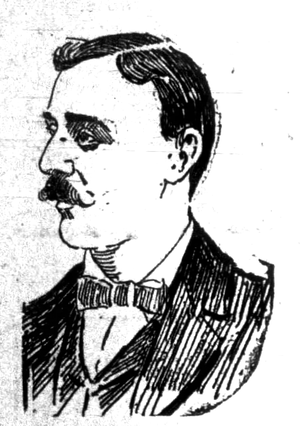 |
| FRED GASS. |
"Of all such cases in my recollection only one offender has been punished, and that in the Indiana district, by the sole exertions of one executive of officer.
"The trade in general surely know, at least the unscrupulous ones of the craft do, the many questions that arise at such times to bring about confusion and tend to retard action being taken, and virtually in the end making the offender the dictator of his own terms of settlement, if there is any at all, mostly owing to the factional feeling that exists in the locals.
"The bad effect of this is plainly seen in one of the latest cases. The bold and brazen front presented by the accused brother when confronted with proof of his guilt, showed that he feared little and cared less for the consequences, no doubt thinking, as some others did, that the end of the flint union had come with the closing of the big strike. Before committees and in open assembly he persistently denied charges, and after belittling and ridiculing some of the brothers for a time, he did the customary hiding act to await developments. Meantime civil suit had been entered, but not without the usual dissensions, and then, when too late, after having by his own acts forced such steps, he acknowledged the wrong and appeals to the local for a settlement, and is now preparing to stand trial. It remains to be seen what the outcome will be.
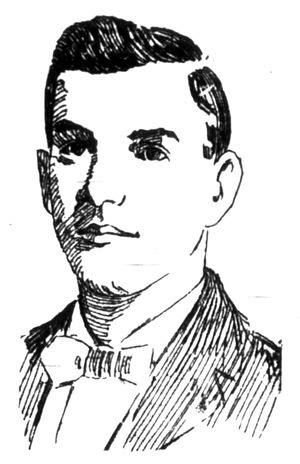 |
| JOHN H. CLARKE. |
"The defiant attitude assumed by such brothers when charged some believe is partly due to the fact that in all such cases a portion of the local members show a disinclination to go against them, thereby giving encouragement and indirect aid. Be that as it may, it only too often leaves that impression. Now, while said members generally admit the guilt of the accused brothers in such instances, and believe they deserve punishment, yet they give various reasons in an attempted justification of their own inaction or weakness, which they attempt sometimes to hide by trying to make it appear that the other fellows are too anxious to proceed or this or that brother said or did so and so.
"When an accused brother, in the face of positive proof, makes no acknowledgement, it's evident he figured the consequences lightly, and it bespeaks little for the action of said members.
"In suggesting a consideration of a more effective law, I am not inclined to be unmerciful. We all have our failings, but an acknowledgement of wrong at time of detection appeals to the better nature, and is at times deserving of mercy, which is hardly ever found wanting. But I think, like many others, that a man that willingly takes the obligation and accepts or seeks a position of trust, and then by systematic robbery basely betrays it, and then when detected gives back denial and abuse, is without exception organized labor's worst enemy and is entirely unworthy of sympathy, but it seems it is timidity on our part they depend on to save them. A person might doubt whether or not the principle can be maintained if such is to continue. There is no question but what the escape of such individuals has a demoralizing effect in the trade more so perhaps than we suspect. When we see at times members apparently active in missionary work who failed to throw their influence against men whose unscrupulous and treasonable acts make them despised, even by non-unionists, and are in a sense at least partly responsible for the growth of non-unionism, one would wonder that we command the respect we do as an organization."
WHAT MORRISON SAYS
A Delegate Who Recently Visited Scene
of Trouble at Lapel.
Hon. James Morrison, district organizer of the American Flint Glass Workers' Union, and a delegate to this convention from Anderson, was at Lapel, Wednesday. His efforts to hold a conference with Woodwards and Wilcoxens was futile. Mr. Morrison believes that not only the management of the factories, but the people in the town will take the right view of the matter and that a settlement will be effected.
The Wilcoxens are well known to the glass trade. They came from Millville, N. J. Since going to Lapel they have been running a non union factory. The opportunity afforded them to skin the men in their employ has been industriously improved and so strong is the graft they have been working that they are loth to give it up. It is claimed that they advance money to blowers, and exact 25 per cent interest. The more a man borrows of them the more assurance he has of holding his job. This sort of shylock system is the main reason why the Wilcoxens refuse to unionize their factory. The 25 per cent interest business would stop. Much of the prejudice at Lapel against union matters is due to the misrepresentations of the Wilcoxens. They have told all sorts of stories to the people and claimed they could not operate their plant under union wages and customs.
The Woodwards were disposed to be fair until within the past few days, when they discharged a number of employes because they belonged to the trade's union. Mr. Morrison believes that in time the people at Lapel as well as the manufacturers will look at the matter in a different light.
THE NATIONAL OFFICERS.
President and Treasurer — W. S. Smith, Pittsburg.
Vice President — Thomas Smart, Alton, Ill.
Secretary — John Kunzler, Pittsburg.
Assistant Secretary — Wm. J. Clair, Pittsburg.
National Organizer — Thomas Rowe, Toledo, O.
WINDOW COMBINE
Important Meeting in Chicago Will
Decide Its Fate.
President James A. Chambers and H. Sellers McKee, of the American Glass Co., of Pittsburg, with James H. Reed, the president of the Philadelphia Company, which controls all the gas and street railway systems of Pittsburg, and is a creature of the great Baltimore banking house of Alex. Brown & Sons are there also. It is thought that Mr. Reed attended the Chicago meeting as the representative of the Browns, who have been from the first, named as the backers of the new trust.
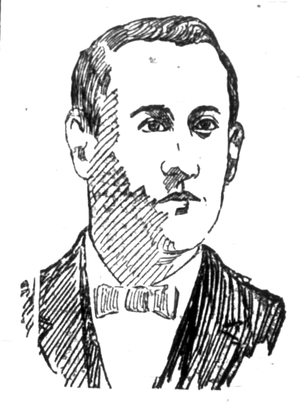 |
| EDWARD GOTTLOEB. |
All the appraisers have completed their reports on the plants optioned by the promoters, and these reports will be the feature of the Chicago meeting. These reports will have great influence on future plans. If they result in a determination to continue the work of formation, the next move will have to be towards scaling down the options to some reasonable figure. Here is where the promoters are most apt to strike the rocks. Not an option has been secured that does not place a greatly inflated value upon the plants, a value that would simply make it imposible [sic] impossible for the promoters to put the deal through. The rapid growth of independent production in strong hands and the pronounced preference given such factories by the best workmen, are making the givers of many of these gift edged options very independent, and they will sooner take a stand with the outsiders than suffer their options to be reduced.
There are many such firms who have given options to the promoters, thus making the future of the trust anything but certain. Nothing definite can be told until after the Chicago meeting, and may be not then, but still there is no indication that at the best the proposed trust can secure control of over 80 per cent of the production. The times are against the formation of trusts now. and there seems to be a long and rocky road still ahead of the proposed window trust. Up to the present time $25,000 has been spent on appraisements and other matters connected with the formation of the scheme.
FLINT SNAP SHOTS.
The names of the three co-operative window firms building 12-pot factories at Matthews. Ind., are LaRuche Window Glass Co., Sun Window Glass Co. and Matthews Co-operative Window Glass Co.
A big English window glass company is said to have an agent now in Canada looking for a site for a branch factory.
The Anderson Flint Bottle Co. will erect a continuous tank during the summer stop.
Matthews gave each of the three cooperative companies four acres of ground, a gas well complete and piped to the factory, and pick of any ten unsold lots in the town.
Chairman Charles Edmonds is one of the busiest men in Muncie right now, and is proving the right man in the right place. He is a wheel horse in the union, having been a member of the organization when it was dangerous to let the fact be known.
James Burke, a member of the committee, employed at Hemingray's, has been on the sick list for a few days.
The parade tomorrow afternoon will be an imposing affair.
If you haven't a few flags spread out in front of your home or place of residence, procure them at once.
Everybody is invited to hear the eloquent addresses at Heekin Park tomorrow afternoon.
The first session of the convention will be Tuesday morning.
The weather man is doing his part well by cooling the atmosphere to start with. Hope he keeps it up.
The place for the big banquet has been changed from Union Labor Hall to Shirk’s Hall.
With her trim decorations the Courthouse presents a gay appearance.
President Smith will arrive today with the Eastern delegation.
John Taylor, of Marion, and Thomas Conway, of Alexandria, are the first delegates to arrive. They came in Friday, and will remain until after the meeting.
The News endeavored to secure a picture of all members of the General Committee on Arrangements, but in some instances failed. They will be used later during the convention.
The outlook for the proposed combination of tableware manufacturers is not now as fair as pictured some weeks ago, and it is becoming very doubtful if success will finally crown the efforts of the projectors.
The combination of flint glass tableware manufacturers, was chartered at Harrisburg Wednesday. July 6. The trust is to be known as the National Glass Co., and has a nominal capitalization of $1,000.
A method of writing with aluminum on glass has been patented in Germany. The glass is moistened with vinegar, and the drawing or writing done with an aluminum point, fine particles of the metal adhering to the glass, which when dry show's the markings in silvery lines that can not easily be removed by friction.
It looks now as if the lamp chimney combination was going to be a success from the start.
There promises to be a special train from Elwood Monday morning. Marion, Fairmount, Summitville, Alexandria and several other towns will come on it.
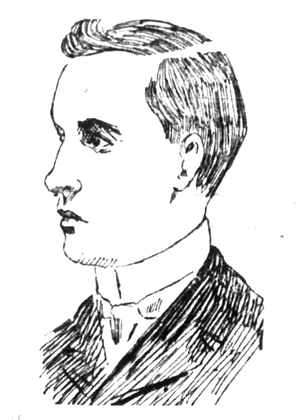 |
| CHARLES JENKINS. |
The delegates to this convention are a fine set of fellows, representing the greatest labor organization in the world, and during their stay in the city will prove well worthy of the warm hand that will be tendered them on all sides.
Because of the failure to settle the dispute that exists between the Indiana and City bands, only one of them will participate in the parade.
P. J. Scaley, a jovial big flint from Wheeling, W. Va., arrived last evening in advance of the other delegates from his locality, and he was quite sorry for it. His train was delayed on several occasions, and his arrival was belated. Mr. Scaley is a fine example of manhood, and has filled the position of a policeman in Wheeling.
John H. Clark and John Spencer have been attending trains for two days, corting the delegates to headquarters.
S. R. Hudson and other members of the committee went on duty last night, and will be a busy set today.
In addition to the general committee rooms in the Bennett block, private parlors have been prepared for visitors who seek rest and quitude [sic] quietude.
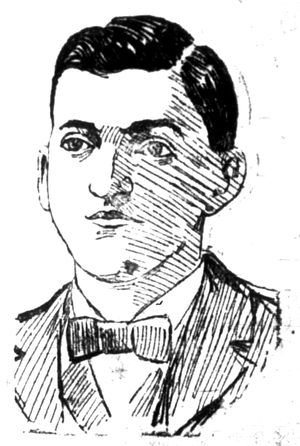 |
| ANDREW BURKHARDT. |
The parade will move promptly at 1 o'clock Monday afternoon, as announced in this paper. Other reports are not true.
Committee headquarters have been gorgeously decorated for the occasion, and the court-room where the meetings occur will attract no little attention.
Chairman Edmonds, of the local Committee on Arrangements, has for the past fifteen years been a member of the Executive Board of the National Head, and to him is due credit for the introduction of the universal list, called the yellow-back book.
John H. Hinkley, a delegate, and employed at the Muncie Flint glass works, was for five years Vice President of the National organization.
The union street car conductors and motormen have secured badges in honor of the flint glass workers' convention which bear the following words: "Welcome, A. F. G. W. U."
Casper Orebaugh, Grand Marshal of the parade, has several changes in contemplation. The line-up of the local unions, outside of the glass workers, has not yet been fully completed.
The members of Muncie Typographical Union have decided to turn out with the glass workers in their big parade tomorrow.
